Looking out of the window from the Graduates Memorial Building (GMB), where the College Historical Society (the Hist) have their committee room, the sun was shining over Front Square. Unfortunately, the event itself was sparsely attended, possibly due to a noticeable absence of freshers around college all morning. Nonetheless, the event got off to a great start with David Finn, co-director of the Centre for Pain Research in NUI Galway (NUIG), who began by talking us through the pharmacology of the cannabis plant. Finn was keen to stress that we “can’t just talk about cannabis” in general, we “have to be specific about the constituents of the strains that we’re talking about”. Most drugs are made up of a single molecule, while cannabis plants have up to 700 different constituents. This makes it difficult to study and carry out the proper statutory requirements of the FDA. Any legislation around cannabis use for medicinal purposes would have to define the relative ratios within the drug to create a quality-assured product for all distributors. Using equipment like a freeze dryer would help create the best quality product possible. Finn also wished to add chronic pain to the list of cases that could be treated with medicinal cannabis. The list currently recommends cannabis in the future treatment of spasticity from Multiple Sclerosis, nausea resulting from chemotherapy and severe refractory epilepsy. UK vendors have started selling CBD oils and gummies online, if you’re thinking of buying some CBD to treat a medical condition you have, take a look at CBD Oil UK. You might also be interested in discreet cannabis packaging provided by your local dispensary.
This topic was discussed further by Rachel O’Neill, a recent graduate of Neuroscience at UCD who highlighted the fact that the only alternative for those suffering with chronic pain is treatment using opioids. Opioids are painkillers, to which a patient gradually develops a tolerance. The more you take them, the greater your tolerance, the greater your tolerance the more you need to take to feel the effects. For this reason, opioid overdose is common among patients. As Finn had pointed out, it is near-impossible to overdose from cannabis and since the introduction of medicinal cannabis to Colorado, there has been a 25 per cent reduction in opioid overdose within the population. Peadar O’Grady, a consultant child psychologist, went on to put that statistic into perspective by stating that if medicinal cannabis was introduced to the US, 10,000 – 15,000 people would not die of overdose each year. O’Grady insisted that to decriminalise cannabis would “save lives”, not turn us all into “drug-addled drop-outs” as member of the Hist, Sarah McGuinness, joked. This proves that cannabis is a safer option than the opioids offered to sufferers of chronic pain. For an even safer option, you could try CBD oil from Sabaidee if the thought of cannabis itself is something you’re cautious about.
Aodhan O’Riordain, Labour Party senator and a prominent advocate for decriminalisation, then argued that the greatest problem surrounding cannabis has nothing to do with side-effects but primarily surrounds the treatment that we provide people in possession of any kind of drug in Ireland. Seventy per cent of those arrested for drug possession in Ireland have it for personal use. O’Riordain therefore highlights that this debate is a class issue: “Some politicians, Guards, judges have at one stage taken illegal drugs during their lives”, and yet no one thinks they should be served with a conviction. O’Riordain sees the “War On Drugs” as “a war on people and a war on a certain type of people”. He pointed to the situation in Portugal where those found in possession of drugs of any kind are interviewed by doctors, nurses and psychologists instead of lawyers, guards and the courts.
William McLoughlin, of the National Secretary of Chronic Pain Ireland, got us back on track to focus more on the original topic of the debate. He told us that all that those seeking the decriminalisation of cannabis want is a “high standard of quality” for the medication. McLoughlin “doesn’t want drugs for everyone”, but rather that patients should be dealt with on a “case by case basis”. The current legislation is “a grey area” and he insists that a law proposed “has to apply to everyone equally otherwise it’s not a democracy”. No doubt there will be more on this in the coming months, with a Dáil session holding a vote on the current bill proposal, in the coming weeks.
Correction: September 26th, 2017
An earlier version of this article incorrectly referred to Aodhan O’Riordain as a Labour minister. In fact, O’Riordain is a former Labour minister and a current Labour Party senator. An earlier version of this article also incorrectly referred to David Finn as David Flynn, and also incorrectly stated where Finn is based: it is NUI Galway, not University College Dublin.







